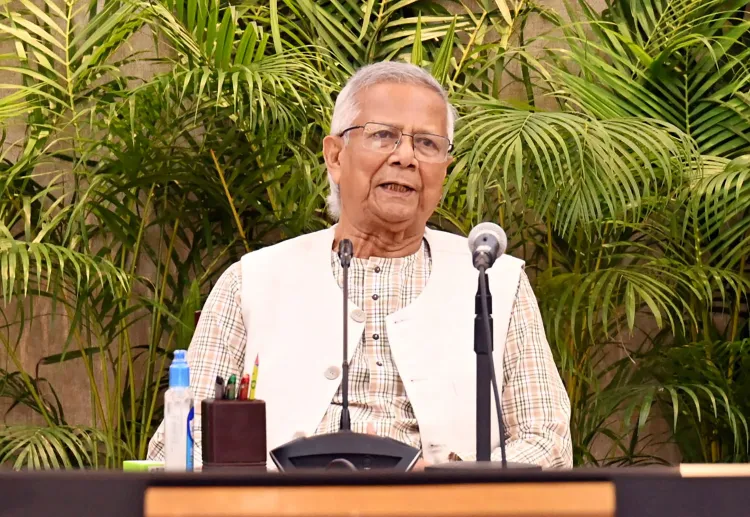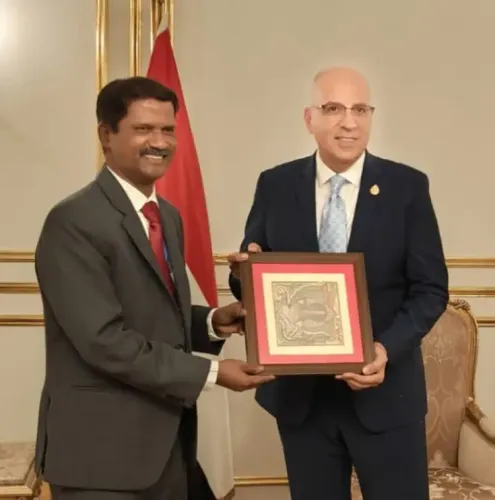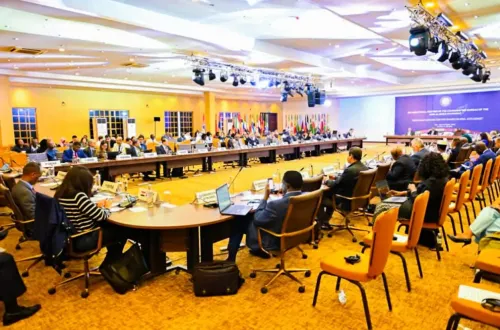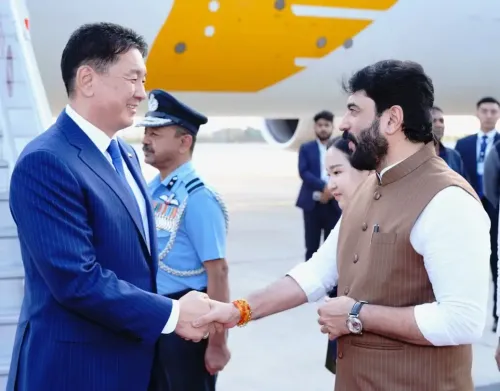Is Yunus Undermining Military Morale to Complete His State Conquest?

Synopsis
Key Takeaways
- Unprecedented Arrests: The International Crimes Tribunal's actions against military personnel are historic.
- Political Motivations: Allegations of political manipulation of the judiciary raise concerns.
- Military Morale: The ongoing situation could significantly impact military trust and cohesion.
- National Stability: The potential for unrest is heightened amidst these developments.
- Judicial Independence: Questions arise about the impartiality of the Tribunal.
Dhaka, Oct 12 (NationPress) The International Crimes Tribunal in Bangladesh has recently issued arrest warrants for 30 individuals, including former Prime Minister Sheikh Hasina and 24 military personnel, with 14 currently in active duty. This marks an unprecedented event in Bangladesh’s history, where a civilian court has sought to arrest such a significant number of serving military officials.
The Chief Advisor of Bangladesh's interim government, Muhammad Yunus, is reportedly undermining the military's morale, humiliating its officers, and dragging them into politically motivated trials. According to a report, his objective is to achieve a complete takeover of the state through terror disguised as law.
On October 6, Justice Md Golam Mortuza Majumder of Tribunal-1 issued a directive for authorities to present all accused individuals before the court by October 22. The list of accused includes former leaders of the Directorate General of Forces Intelligence (DGFI) and the Rapid Action Battalion (RAB) intelligence, which are crucial agencies responsible for the state’s security framework.
Aminul Hoque, in an opinion piece featured in NorthEast News, stated: "Never before in Bangladesh’s history has a civilian court sought to arrest such a large number of serving military officers. The palpable tension within the armed forces is unprecedented. This situation is not about justice but rather a calculated attack on an institution that has historically ensured the state’s stability."
Since assuming power, Yunus and his appointed officials have attempted to manipulate the judiciary and the International Crimes Tribunal as instruments to dismantle the Awami League and obliterate Sheikh Hasina’s legacy. The recent amendment on October 6 highlights the tribunal's political agenda, as it mandates the suspension of anyone accused under its law from any public or constitutional role and prohibits them from participating in elections, as reported by NorthEast News.
By weaponizing the legal system against its own protectors, the regime has potentially unleashed a series of politically charged cases aimed at demoralizing the military and rendering it ineffective as an independent force.
The report outlines a striking betrayal, noting that the Yunus administration ascended to power with military support, which was deployed nationwide under the guise of 'restoring order.' After fourteen months of collaboration, the army finds itself victimized by the very system it bolstered. Why this sudden animosity? The architects of the regime no longer require military protection. Having systematically dismantled constitutional institutions—from the Election Commission to the Supreme Court—they now aim to subdue the military. The army’s prior cooperation lent credibility to a government that has curtailed civil rights, fostered mob violence, and empowered radical factions. Trust in the armed forces has diminished. With their reputation tarnished, Dr. Yunus and his deep-state allies are tightening control. The military can either remain a tool or face scapegoating through the legal system.
According to the report, the army chief's appeal for the protection of his officers was denied by the Chief Justice. Aminul Hoque remarked: "Today, the entity they nurtured has turned against them. This is Bangladesh’s Frankenstein moment. By undermining the military’s morale, humiliating its officers, and dragging them into politically motivated trials, Dr. Yunus aims to finalize the conquest of the state—not with tanks, but through terror disguised as law. Even more revealing is the image of the Army Chief himself pleading with the Chief Justice to safeguard his officers—only to face rejection."
This spectacle underscores the extent of the decline. A soldier is trained to sacrifice for his commander’s orders, expecting his superiors to defend him. What occurs when that trust erodes? When soldiers witness their commanders rendered powerless—reduced to pawns in a regime's cynical maneuver—the institution itself begins to disintegrate from within. This, perhaps, is exactly what Dr. Yunus intends. The arrest warrants are not the conclusion—they are merely the opening shots in a campaign to shatter the army’s spirit.









